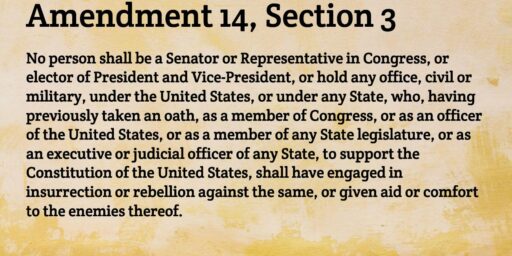What if Roe Were Overturned?
Will Baude has an op-ed in today’s New York Times considering the consequences of an overturn of Roe v. Wade. He notes that that even some pro-choicers have called for “untether[ing] abortion rights” from “a Supreme Court decision whose reasoning has not held up” and that others have said that turning it over to the states would help end three decades of acrimony. Baude disagrees.
It’s unlikely that Congress would pass a comprehensive federal ban on or right to abortion. So in the absence of Roe, states would largely be free to regulate the issue as they saw fit. Some states would permit abortion on demand, while some would ban it; many would fall somewhere in between. A patchwork of state abortion regulations, however, will lead not to compromise, but chaos.
The common refrain in the anti-Roe pro-choice camp is that women in anti-abortion states will simply travel elsewhere to end their pregnancies. But it’s unlikely that states with strict regulations on abortion would stand idle, and they will have many legal tools at their disposal.
States could make it illegal to cross state lines in order to abort a fetus – a tactic Ireland tried in the early 1990’s, until a court decision and subsequent constitutional amendment recognized a right to travel. While the Supreme Court has recognized a constitutional right to travel across state lines, it has also recognized exceptions.
[…]
Without Roe, the federal courts would be flooded with such disputes. Abortion cases, now further encumbered by issues of family rights and the powers of states to regulate trade across state lines, would once again end up before the Supreme Court. And though a doctrine called “conflict of laws” exists to settle legal disagreements between jurisdictions, this kind of interstate regulatory warfare has been mercifully rare in our nation’s history. The precedents are muddy, the standards unclear, and so it is almost impossible to know how a future Supreme Court would resolve the matter.
Sadly, this is probably right. A handful of states (the Deep South and Utah come to mind) would likely ban abortion altogether. Not only would there almost certainly be additional laws to prevent crossing state lines to get an abortion, there would presumably be a spate of suits to overturn the anti-abortion bans, whether on some new federal constitutional arguments or based on creative interpretations of state constitutions.
Abortion would never have become the polarizing issue it is absent Roe. Having the issue decided by judicial fiat on flimsy pretense created substantial outrage. But after thirty years of organizing around the issue, it would surely not go away if Roe were overturned. (Which, incidentally, I do not expect to happen.)
Baude’s argument is consequentialist, not philosophical. While I agree that overturning Roe might actually do more harm than good in terms of resolving the abortion fight, it would nonetheless be the right thing to do. Bad law is bad law. Indeed, parts of Roe, notably its out-of-thin air trimester framework, have already been modified by subsequent cases.
I do agree that, ultimately, the issue will have to be resolved at the federal level. While there is little in the written Constitution that would give the Congress power to legislate in this area, there are decades of precedent for them to do so. After all, if the FDA and federal marijuana laws are legal, Congress surely has jurisdiction over abortion.
Having the issue decided through the political process, rather than the courts, is the route to ending the generation-long bitterness. My guess is that a consensus would emerge allowing abortion-on-demand early in pregnancy with substantial controls later in pregnancy. The law would include parental notification in the case of minors wanting to have abortions but with the ability for a judge to intervene in cases where the mother genuinely fears abuse. So-called “partial birth abortion” would be banned except in the incredibly rare circumstances where the life of the mother is at serious risk.
That sounds a lot like the status quo, doesn’t it?
The irony is that we have more-or-less resolved this issue already. In states Red and Blue, the legislation that comes out on abortion looks remarkably similar. Partly, this is because they are operating under strictures of Supreme Court precedent. Mostly, though, it is because substantial agreement exists as to where the lines should be drawn. Despite the controversy over the issue, the culture has moved, too.
Yes, there are states where conservative Christians are such an overwhelming majority that almost no abortions would be legal were it up to their state legislatures and perhaps two or three states where women would be free to abort their baby at the last minute just because they felt like it. But, even left to their own devices, almost all states would have essentially the same abortion rules that they have now.
If Baude is right that the issue would ultimately be decided by Congress–and I believe he is–the handful of outliers would be washed away in the give-and-take of the legislative process. We would wind up pretty much where we are now.
Why, then, would the acrimony be gone? Because the outcome of the game is sometimes less important than the sense that it was conducted fairly. Participants in a democracy are used to not getting their way. When we lose, we get over it pretty quickly so long as we think it we were outvoted fair and square. Pro-lifers are so angry right now because they feel that the referees have stolen the game from them with a bad call.
Update: Will has a short blog post on the editorial. It is followed in sequence by posts from his Crescat colleagues Quaker, a rejoiner from Will, and a slight redirect from Quaker. I would be rather surprised if it ended there.
Minor spelling and grammatical corrections made to original.






It’s unlikely that a state would be able to ban a noncriminal adult from crossing state borders.
To do something that’s illegal at home? There’s certainly precedent for that.
I concur that the ultimate result would look an awful lot like the status quo.
The only states I am convinced would outright ban abortion are Utah and Mississippi. And, quite frankly, it is almost banned in Mississippi as it is (I am not sure of the situation in Utah at the moment).
I am not convinced that it would be banned in Alabama, to be honest.
James Joyner: “There’s certainly precedent for [states outlawing travel to do something illegal if done within the state].”
Well, I can’t think of any such precedent in the US, unless you count laws concerning minors, and laws against bringing contraband back to the outlawing state. We can all fly to Amsterdam, states never prevented going to Nevada to gamble or get a divorce, or other countries or states to drink during Prohibition and then when some states had prohibition. Even Robert Bork pointed to freedom to travel (including to leave a jurisdiction) as an example of a fundamental right from English common law, even though unenumerated in the Constitution. The Mann Act against traveling across state lines for “immoral purposes” was a federal law whose state-line crossing requirement was a limitation on the law, back when the feds saw more limited jurisdiction over intrastate issues. I am aware of no states making a similar law.
Would you name some such precedents?